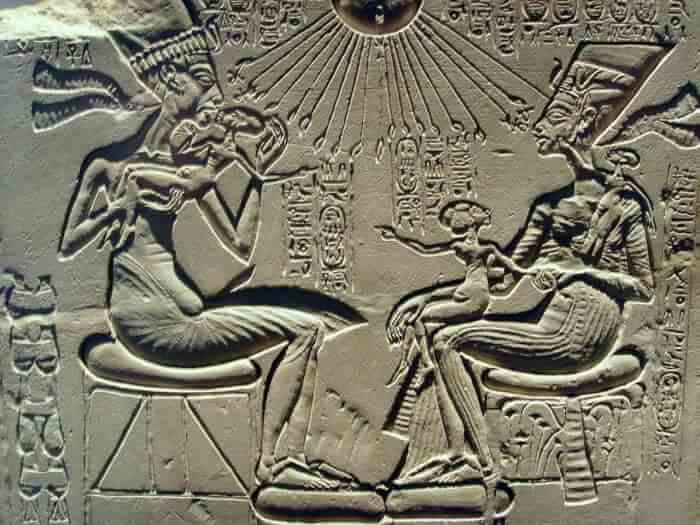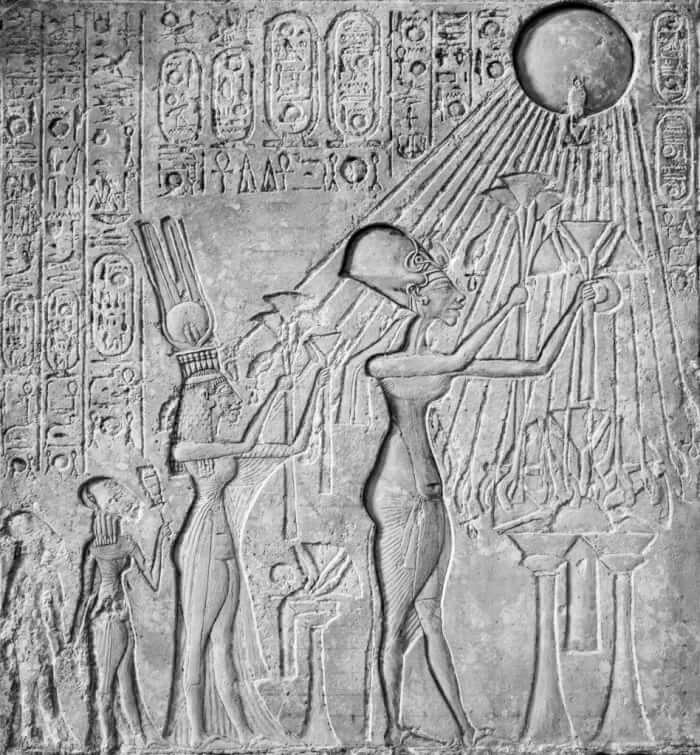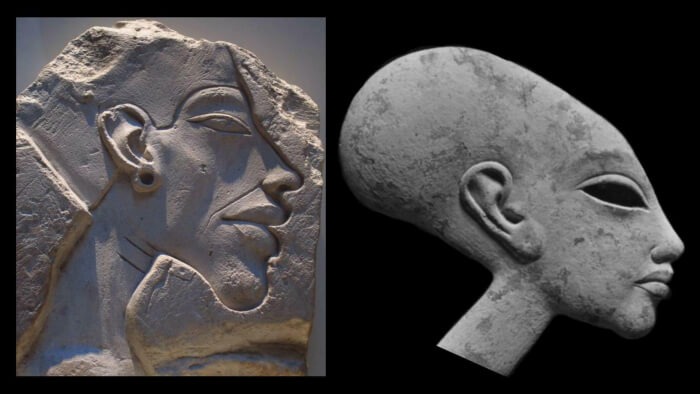Was Akhenaten An Extraterrestrial Ruler Of Ancient Egypt?
It’s undeniable that Akhenaten has been among the most mysterious Pharaohs ever to have ruled ancient Egypt. A controversial and influential monarch, Akhenaten is regarded by many as one of the world’s most revolutionary religious innovators.
Akhenaten governed the region of Pharaohs during the 18th Dynasty of Egypt, with the son being Tutankhamun and the wife being Queen Nefertiti. Intriguingly, before the 5th year of his reign, he was known as Amenhotep IV. Totally, he ruled Egypt for 17 years.
The most famous feature when it comes to mentioning the name of Akhenaten is that the Pharaoh forsook conventional Egyptian pantheon and brought in the new system of worship focusing on one God only, Aten.
Often known as the ‘Sun Disk’ in prehistoric documents as a deity in the Story of Sinuhe from the 12th Dynasty of Egypt, where the king is depicted as rising as a god to the heavens and uniting with the sun-disk, the divine body merging with its maker.
During his reign, Akhenaten made an absolutely mysterious announcement, “There is only one god, my father. I can approach him by day, by night.” He was possibly the earliest monotheist in mankind’s history, preceding Abraham, Isaac, Jacob and Muhammad.
In documents on Egyptian Mythology, Akhenaten descended from the divine beings visited Earth during the period of Zep Tepi, remaining in the beliefs of many now as having descended from the Stars. The event itself is currently deemed as actually happened by a number of experts.
In fact, in the Pyramid Text, there was a time that emerged from the primordial chaos and the way the divine ruled the Earth, called “Zep Tepi”. Numerous researchers including Armando Mei believe that this chronological period can be dated back particularly to 36,420 BC.
Writings by Akhenaten himself and subsequent poems about him mentioned that the Pharaoh had guests “from the sky” who instructed him and they might have been the reason he discarded all other gods in the pantheon and only worshipped one then.
Declaring himself as a direct descendant of Aten, just like any other previous pharaohs who considered themselves divine beings, Akhenaten claimed to be a god. The point is, not only Akhenaten saw himself so, but the entire Egypt did.
Several changes were carried out during Akhenaten’s reign, including the establishment of a new capital city named Amarna, devoted to the sun, where Akhenaten spent his next decade there. During that time, the Pharaoh introduced changes in art and culture alongside the most significant one, which is how he would be publicly illustrated.
Unlike other Pharaohs, Akhenaten wanted himself to be depicted as the person he virtually was, instead of being triangular-shaped beings with strong shoulders and skinny waists to reflect the power.
According to Donald B. Redford, some have even considered Akhenaten as one of Jesus’ herald. He said: “Before much of the archaeological evidence from Thebes and from Tell el-Amarna became available, wishful thinking sometimes turned Akhenaten into a humane teacher of the true God, a mentor of Moses, a Christlike figure, a philosopher before his time.”
However, the mysteries surrounding Akhenaten is, perhaps, far more complicated than our imagination. Akhenaten was regarded as “the first individual in history” by historian James Henry Breasted, while also claiming that he was one of the first, if not the first monotheist, romanticist and scientist.
In 1899, Flinders Petrie stated: “If this were a new religion, invented to satisfy our modern scientific conceptions, we could not find a flaw in the correctness of this view of the energy of the solar system.”
He added, “How much Akhenaten understood, we cannot say, but he certainly bounded forward in his views and symbolism to a position which we cannot logically improve upon at the present day. Not a rag of superstition or of falsity can be found clinging to this new worship evolved out of the old Aton of Heliopolis, the sole Lord of the universe.”
What made Akhenaten remarkably outstanding compared to other Egyptian rulers does not simply come from his unique reign, but also from his clear connection with something outside of our world, a possible alien origin unique to Egypt.
Akhenaten governed the region of Pharaohs during the 18th Dynasty of Egypt, with the son being Tutankhamun and the wife being Queen Nefertiti. Intriguingly, before the 5th year of his reign, he was known as Amenhotep IV. Totally, he ruled Egypt for 17 years.
The most famous feature when it comes to mentioning the name of Akhenaten is that the Pharaoh forsook conventional Egyptian pantheon and brought in the new system of worship focusing on one God only, Aten.
Often known as the ‘Sun Disk’ in prehistoric documents as a deity in the Story of Sinuhe from the 12th Dynasty of Egypt, where the king is depicted as rising as a god to the heavens and uniting with the sun-disk, the divine body merging with its maker.
Alien Origin
 Source: Wikimedia Commons
Source: Wikimedia Commons
During his reign, Akhenaten made an absolutely mysterious announcement, “There is only one god, my father. I can approach him by day, by night.” He was possibly the earliest monotheist in mankind’s history, preceding Abraham, Isaac, Jacob and Muhammad.
In documents on Egyptian Mythology, Akhenaten descended from the divine beings visited Earth during the period of Zep Tepi, remaining in the beliefs of many now as having descended from the Stars. The event itself is currently deemed as actually happened by a number of experts.
In fact, in the Pyramid Text, there was a time that emerged from the primordial chaos and the way the divine ruled the Earth, called “Zep Tepi”. Numerous researchers including Armando Mei believe that this chronological period can be dated back particularly to 36,420 BC.
Writings by Akhenaten himself and subsequent poems about him mentioned that the Pharaoh had guests “from the sky” who instructed him and they might have been the reason he discarded all other gods in the pantheon and only worshipped one then.
 Source: Wikimedia Commons
Source: Wikimedia Commons
Declaring himself as a direct descendant of Aten, just like any other previous pharaohs who considered themselves divine beings, Akhenaten claimed to be a god. The point is, not only Akhenaten saw himself so, but the entire Egypt did.
Several changes were carried out during Akhenaten’s reign, including the establishment of a new capital city named Amarna, devoted to the sun, where Akhenaten spent his next decade there. During that time, the Pharaoh introduced changes in art and culture alongside the most significant one, which is how he would be publicly illustrated.
Unlike other Pharaohs, Akhenaten wanted himself to be depicted as the person he virtually was, instead of being triangular-shaped beings with strong shoulders and skinny waists to reflect the power.
Divine Origins
Intriguingly, various scholars indicated that Akhenaten might have been pioneer of a monotheistic religion that subsequently became Judaism. Sigmund Freud was among the experts to claim so, while others have compared the connection between Akhenaten and Aten to that between Jesus Christ and God.According to Donald B. Redford, some have even considered Akhenaten as one of Jesus’ herald. He said: “Before much of the archaeological evidence from Thebes and from Tell el-Amarna became available, wishful thinking sometimes turned Akhenaten into a humane teacher of the true God, a mentor of Moses, a Christlike figure, a philosopher before his time.”
 Source: Pinterest
Source: Pinterest
However, the mysteries surrounding Akhenaten is, perhaps, far more complicated than our imagination. Akhenaten was regarded as “the first individual in history” by historian James Henry Breasted, while also claiming that he was one of the first, if not the first monotheist, romanticist and scientist.
In 1899, Flinders Petrie stated: “If this were a new religion, invented to satisfy our modern scientific conceptions, we could not find a flaw in the correctness of this view of the energy of the solar system.”
He added, “How much Akhenaten understood, we cannot say, but he certainly bounded forward in his views and symbolism to a position which we cannot logically improve upon at the present day. Not a rag of superstition or of falsity can be found clinging to this new worship evolved out of the old Aton of Heliopolis, the sole Lord of the universe.”
What made Akhenaten remarkably outstanding compared to other Egyptian rulers does not simply come from his unique reign, but also from his clear connection with something outside of our world, a possible alien origin unique to Egypt.
Share this article
Advertisement